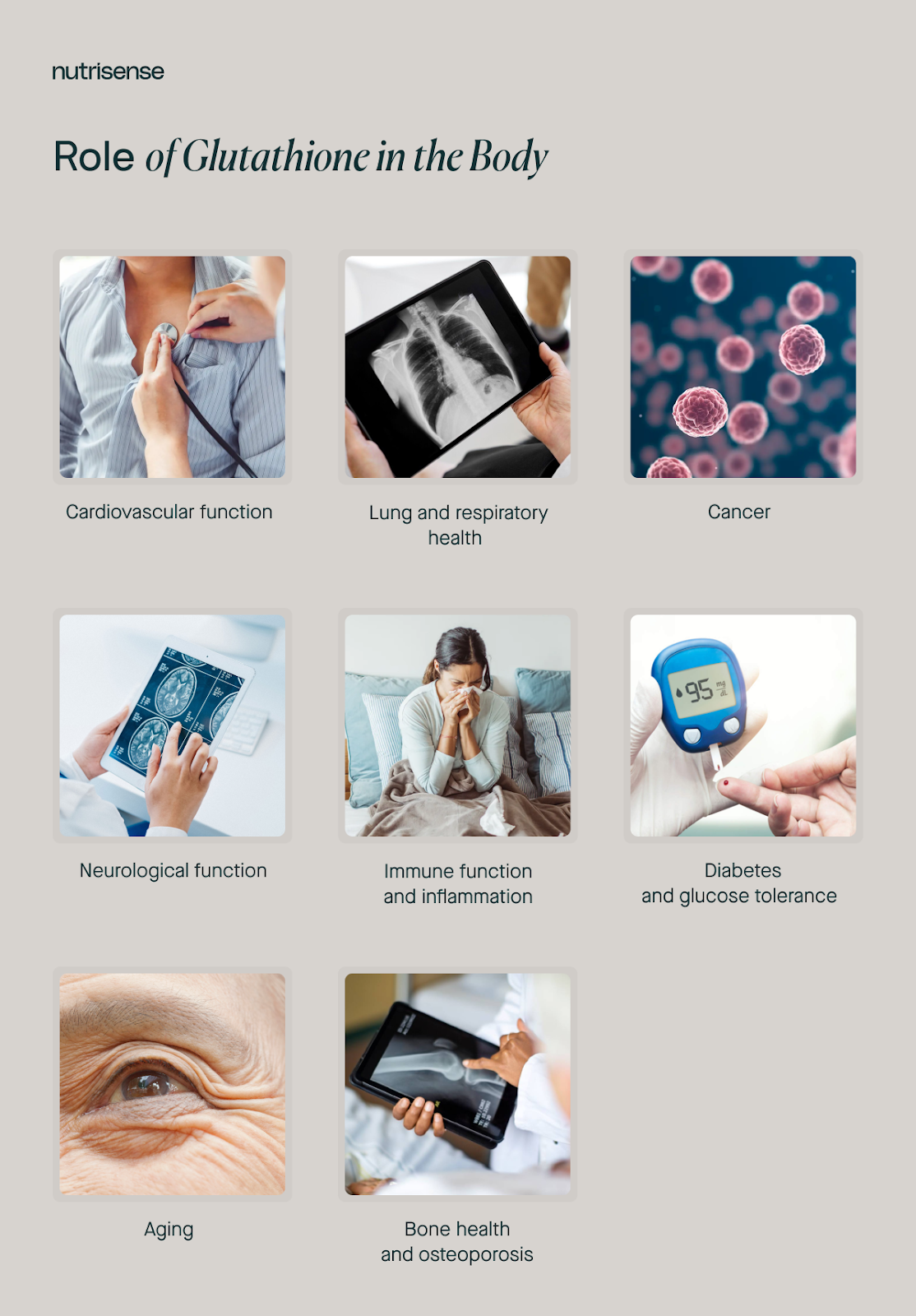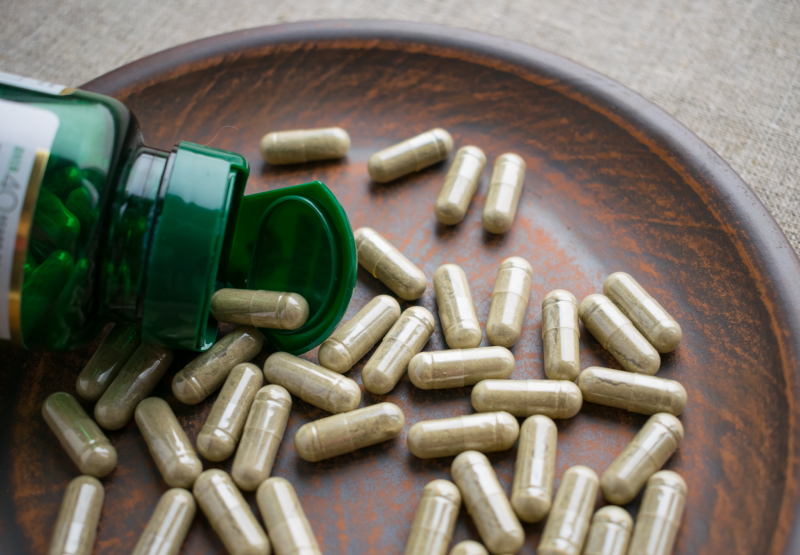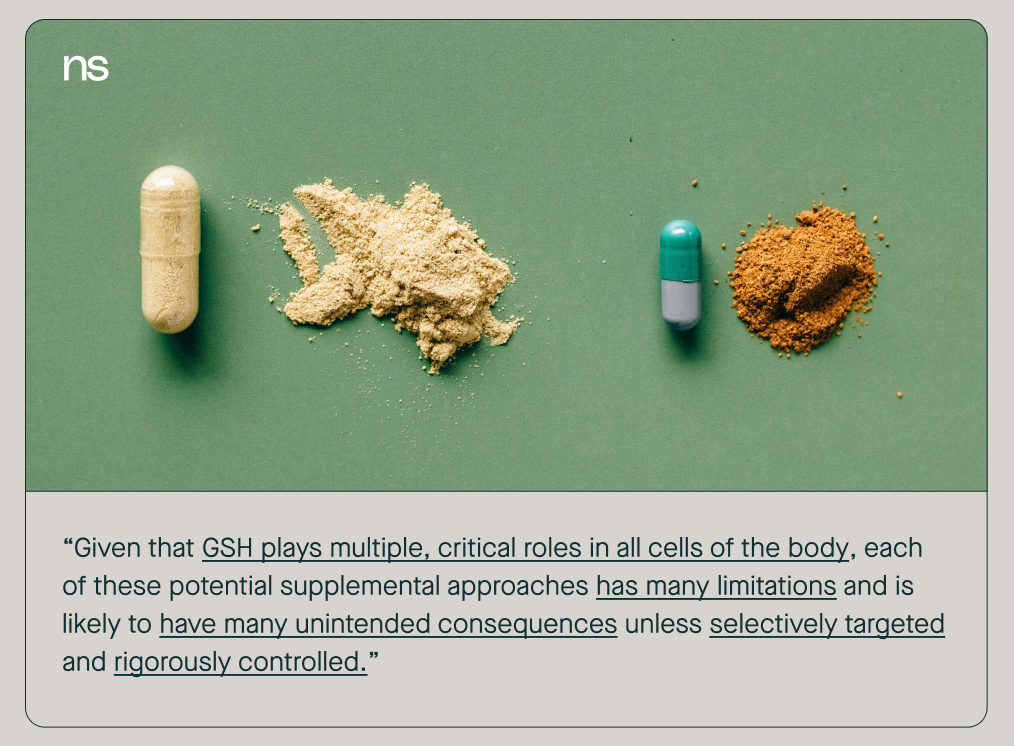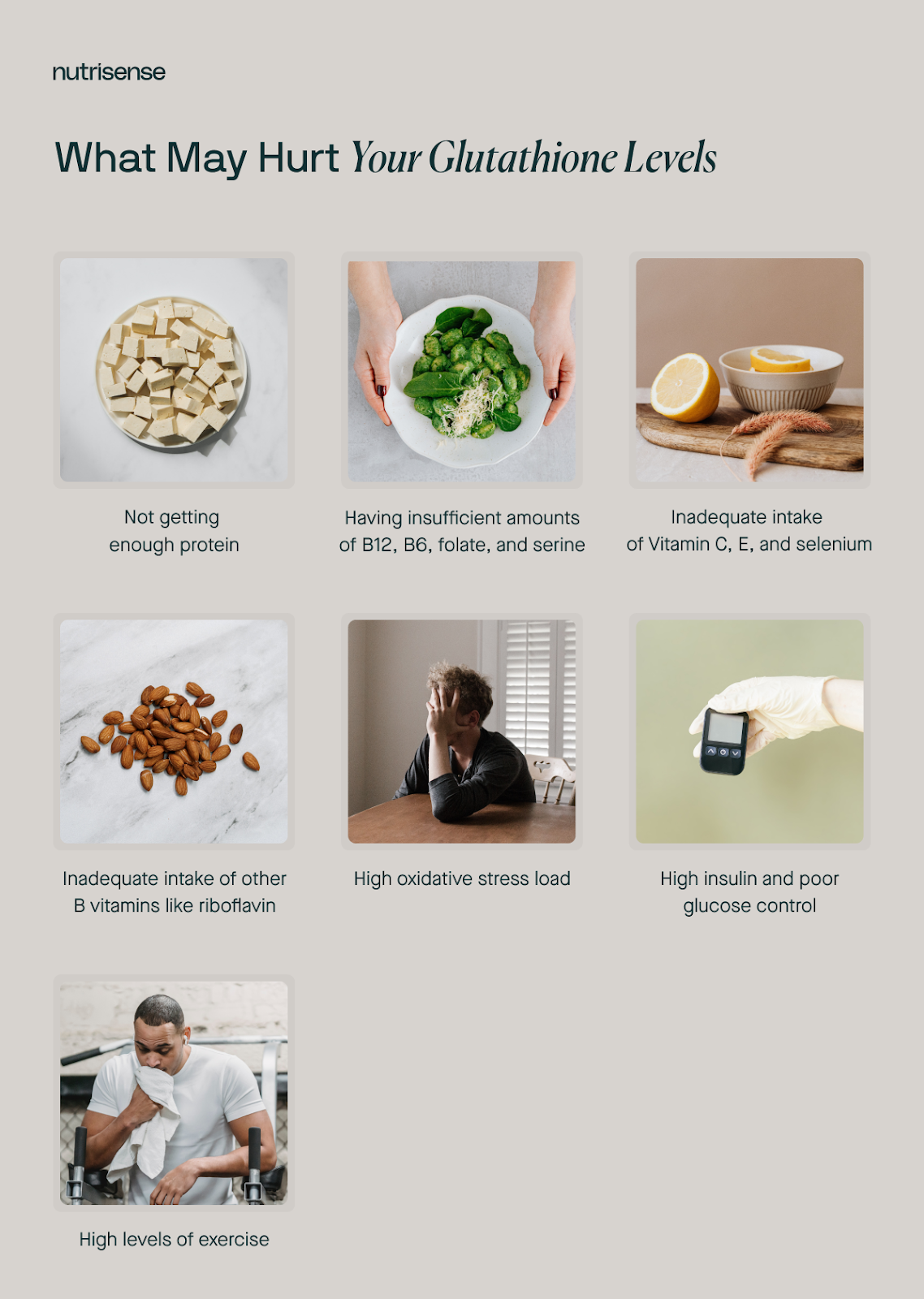Glutathione: Health Benefits and Uses

Key Takeaways
Glutathione is a molecule made by the body that plays a starring role in many metabolic processes. While this molecule can be found in all human tissues, you’ll find some of the highest concentrations in the liver.
But what exactly is this multi-tasking molecule extraordinaire, and how can it impact your health and disease status? In this article, we’ll break down the many health benefits of glutathione and explain how you can boost your levels of this molecule.
What is Glutathione?
Glutathione is a tripeptide made of amino acids glycine, cysteine, and glutamate. Your body can generally produce glutathione efficiently from these amino acid precursors, but many factors can impact this, such as genetics, dietary intake, and environmental factors.
So, what is it that makes glutathione so special? Research on glutathione is growing in popularity, and new studies are helping us understand more about the role glutathione may play in a number of areas of health, including:

4 Major Health Benefits of Glutathione
Glutathione can affect many different areas of the body. Let’s break them down four of the primary processes that glutathione can affect.
1) Functions as an Important Antioxidant

Glutathione is a powerful antioxidant found in the body. In fact, it is often considered the “master antioxidant.”It’s found in two forms: reduced (GSH) and oxidized (GSSG). Reduced GSH which is most effective in acting as an antioxidant, makes up about 98 percent of your glutathione.
Antioxidants are compounds that counteract oxidative stress and free radicals. Free radicals can do a lot of damage to the body if left unchecked. Our body counteracts oxidative stress and free radicals with antioxidant systems that include endogenous antioxidants like GSH and exogenous antioxidants we may get from our diet.
Some antioxidants are consumed from foods such as vitamin C, vitamin E, and selenium, but there are also endogenous antioxidants such as GSH that your body makes.
Antioxidants play an important role in the body, since when you have higher levels of oxidative stress, you may be at an increased risk for certain diseases and health conditions. Unsurprisingly, many of the diseases and conditions associated with oxidative stress are also linked to dysregulations or deficiencies in levels of glutathione.
GSH helps clean up the mess left by oxidative stress, scavenging free radicals and minimizing their damage in the body. Vitamins C and E help GSH do this better and regenerate. GSH is also involved in altering proteins, modifying their structure to protect them from oxidative damage.
2) A Detoxification Power-House
In addition to acting as an antioxidant, GSH plays a central role in helping your body process and eliminate toxins and waste products. GSH assists special detoxification enzymes in the process of transforming wastes and toxins into harmless products your body can excrete.
Some of these enzymes - like formaldehyde dehydrogenase or glutathione S-transferase require glutathione in order to do their job. Glutathione deficiency may impair detoxification.

These enzymes help your body:
- Process and remove metabolic wastes, like hormones and formaldehyde (produced from breakdown of alcohol as well as the amino acid methionine)
- Process and remove environmental toxins like xenobiotics
- Process and remove pharmaceutical drugs like acetaminophen
- Process and remove heavy metals
3) Regulates Metabolism of Glucose, Fats, and Protein
Your cell’s mitochondria depend on GSH for their function and integrity. The mitochondria are specialized organelles inside most human cells (except red blood cells) that produce energy.
GSH also participates in bile formation and secretion, which is an important part of the metabolism of dietary fats and cholesterol.
4) Plays a Role in Inflammation and Other Processes

GSH is required for the production and regulation of compounds involved in inflammation and immune function. For example, it’s involved in the synthesis of the inflammatory mediators leukotrienes and prostaglandins. It also plays a role in cytokine production.
Other cellular processes that need GSH are:
- Cell replication
- Regulation of apoptosis, or cell death
- Gene expression
- Cell-signaling
At this point, you might be wondering if there’s anything GSH doesn’t do!
Blood Sugar and Glutathione
Some research has suggested a connection between insulin resistance, diabetes, and glutathione levels. It’s been shown that hyperglycemia causes an increase in oxidative stress.
They’ve also observed lower GSH levels in those with diabetes compared to normoglycemic individuals and were able to identify defects in antioxidant function in impaired glucose intolerance.
A randomized controlled trial from 2021 found that oral GSH supplementation improved insulin sensitivity in obese subjects with and without T2DM, although it didn’t alter other markers of oxidative stress. More research is needed to determine to what extent GSH supplementation may impact glycemic control.
Other studies have consistently demonstrated that hyperglycemia is associated with low levels of glutathione in those with uncontrolled diabetes. One study used supplemental precursor amino acids cysteine and glycine over a 14-day period to successfully restore glutathione synthesis and lower oxidative stress and oxidant damage.
Glutathione and Disease
It’s pretty obvious by now that there are no shortage of ways glutathione production may impact health. In fact, changes in GSH levels and/or oxidation state have now been reported in nearly all major human diseases. However, scientists still have many unanswered questions.
For example, it remains unclear exactly how GSH impacts the development and progression of different disease states. Researchers also don’t know to what extent GSH supplements influence these outcomes over time and what dosage and type of supplements may be best for different conditions.
What they do know is that many conditions are associated with dysregulations or deficiencies in glutathione, such as:

- Neurodegenerative diseases like Parkinson’s disease and Alzheimer’s disease
- Age-related cataracts, macular degeneration, and glaucoma as well as age-related hearing impairments
- Cancer
- Cardiovascular disease - especially hypertension and atherosclerosis.
- Pulmonary disease - especially asthma and COPD
- Autoimmune disease
- Diabetes mellitus
- Cystic fibrosis
Glutathione Supplements: Do They Work?
As some studies suggest a possible benefit in supplementing GSH, manufacturers have jumped at the chance to line the shelves with options. But what’s the truth behind the claims? Do glutathione supplements work? What are the side effects?
The most commonly tested forms of GSH supplements include reduced GSH and liposomal GSH. Some studies show promise with liposomal forms of GSH as a more effective form compared to reduced GSH.
A pilot study of oral liposomal GSH conducted in healthy adults found that supplementation increased GSH levels and reduced oxidative stress biomarkers. Enhancements in immune function markers were also observed. While these results were not statistically significant, researchers say the small sample size in this study could have skewed those results.
Glutathione Supplement Considerations

It’s good to keep in mind the considerations and concerns that scientists have shared related to glutathione supplements. These include:
- Reference ranges for measuring GSH in the body are lacking and muddied by individual variation.
- Studies are limited at this point and many may present conflicting results. Some studies show no change in GSH status upon supplementation of oral glutathione (reduced form) in healthy subjects.
- Optimal forms of GSH supplementation are still debated.
While there may be some promising preliminary findings overall, this research is still new and caution should be taken when concluding that taking oral supplements of GSH daily is necessary or beneficial.
What about N-Acetyl Cysteine?
The dietary supplement N-acetyl cysteine (NAC) is also considered as a method of increasing GSH levels. NAC provides cysteine, one of the three amino acids that makes up GSH.
Most of the research and clinical use of NAC has been in lung disease, both for its antioxidant effects and its mucus-thinning action. However, while some studies show beneficial effects, others cast doubt and concern.
Because cysteine can cross the blood-brain barrier, this supplement offered promise for some as a way to boost GSH levels in neuronal dysfunction such as Parkinson’s. Unfortunately, these study designs proved to be unsuccessful due in part to the excitotoxicity effect of NAC.
The researchers in one article on GSH supplementation expressed:

Of course, no matter what you do, don’t forget that all supplements are best guided by a qualified healthcare provider who can help you decide what’s right for you.
Support Your Body’s Own Production of GSH
Since your body makes GSH, you might be wondering what you can do to support its production without supplemental GSH or NAC. Unfortunately, research looking at how nutritional interventions might improve glutathione status is limited.
However, we do know that glutathione levels are affected by nutritional status, hormonal levels, and even stress levels. They also appear to be affected by things like pregnancy and exercise.
What May Hurt Your Glutathione Levels

The factors that could reduce your glutathione levels may include:
- Not getting enough protein (especially cysteine-rich protein)
- Having insufficient amounts of B12, B6, folate, and serine - which are important for cysteine metabolism
- Inadequate intake of Vitamin C, E, and selenium
- Inadequate intake of other B vitamins like riboflavin
- High oxidative stress load from things like poor diet, smoking, excessive alcohol intake, or environmental pollutant exposures
- High insulin and poor glucose control
- High levels of exercise
What May Help Your Glutathione Levels

The factors that could support healthy glutathione levels may include:
- Getting enough protein
- Ensuring adequate intake of vitamins and minerals, especially C, E, B vitamins, and selenium, without overdoing it
- Quitting smoking
- Reducing alcohol
- Managing environmental xenobiotic exposures
- Eating to support your workouts and activity level, including an antioxidant-rich diet
- Getting plenty of omega 3 fats
Some studies report that cruciferous vegetables may have a positive effect on GSH levels. However, the results may depend on genetic factors and more research is needed. Researchers recommend eating raw or mildly steamed to preserve the integrity of sulfur compounds and avoid freezing these veggies.
Some studies looking at herbs like turmeric and milk thistle found that these may impact GSH levels. However, their effect may be particularly dose-dependent and more research is needed before specific recommendations can be made.
Find the right Nutrisense programto turn insight into progress.
Go Beyond Glucose Data with Nutrisense
Your glucose can significantly impact how your body feels and functions. That’s why stable levels are an important factor in supporting overall wellbeing. But viewing glucose isn't enough. Nutrisense, you’ll be able to learn how to use your body's data to make informed lifestyle choices that support healthy living.
One-to-one coaching
Sign up to access insurance-covered video calls to work with a glucose expert: a personal registered dietitian or certified nutritionist who will help tailor your lifestyle and diet to your goals.
Monitor and measure what matters
With the Nutrisense CGM Program, you can monitor your glucose with health tech like glucose biosensors and continuous glucose monitor (CGM)s, and analyze the trends over time with the Nutrisense App. This will help you make the most informed choices about the foods you consume and their impact on your health.
Find your best fit
Ready to take the first step? Start with our quiz to find the right Nutrisense program to help you take control.

Isra Bashiti is a registered dietitian nutritionist who grew up in Texas and graduated with a Master’s degree in Nutritional Sciences and Dietetics. She worked in the clinical setting for a few years as a Health Coach and Dietitian, focusing specifically on preventative health and community nutrition.




